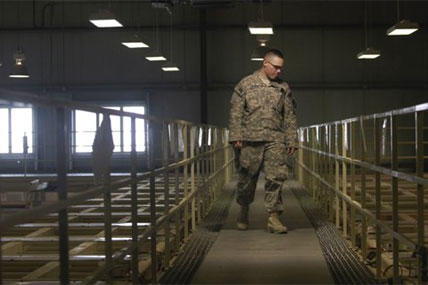The U.S. handed over nominal control of the main jail in Afghanistan to the Kabul government Monday under a sketchy agreement that left scores of detainees in U.S. custody indefinitely.
"Today was a very good day," Afghan President Hamid Karzai said of the ceremony that transferred the sprawling U.S. Detention Facility in Parwan about 25 miles north of Kabul to Afghan jurisdiction.
Karzai, who spoke at a joint news conference with visiting Secretary of State John Kerry, had threatened to reject a status of forces agreement allowing coalition forces to remain in Afghanistan past 2014 unless the jail and prisoner issues were resolved.
The agreement for the transfer of the prison and its continued operation by the Afghans was part of a Memorandum of Understanding between the U.S. and the Afghans, which was not made public.
Thousands of prisoners of Afghan nationality will now come under Kabul's jurisdiction but those deemed Enduring Security Threats, or "ESTs" will remain under U.S. control along with "foreign nationals" – Pakistanis, Saudis, Yemenis and others – who have been detained by U.S. forces over the course of the war.
The Kabul government has repeatedly declined to take custody of the foreign nationals, and the impasse was a factor in delaying the Parwan turnover several times.
Several U.S. officials with the International Security Assistance Force in Afghanistan and at the Pentagon have acknowledged the presence of ESTs and foreign nationals in the Parwan population without fully commenting on their status or confirming how many of them are being held. Advocacy groups and published reports have put the number of ESTs between 30-40 and foreign nationals at about 50.
The status of the foreign nationals "has never been a part of the negotiations between Karzai and the U.S. government" on Parwan, said Tina Foster, executive director of the International Justice Network advocacy group, which represents several families of Parwan detainees.
"It's the dirty little secret of the war," Foster said. The detainees at Parwan "have fewer rights than the people at Guantanamo.
"We really are in terra incognita (unknown territory) here" in dealing with the prisoners in U.S. custody in Afghanistan in terms of international law and the law of armed conflict, said Gary Solis, a former Marine Judge Advocate General who teaches the law of armed conflict at West Point.
"I don't think anyone knows what we're going to do with these guys," Solis said. "This is not an issue governed by the law of armed conflict."
At the Parwan facility on Monday, a senior Afghan official said that "Since March 2012, the Americans have handed over to us 4,000 prisoners. We have freed 1,350 of them. The Americans have given us 26 more prisoners today, and they still have more prisoners which they will hand over to us soon," the BBC reported.
In a statement, Marine Gen. Joseph Dunford, commander of U.S. and coalition forces in Afghanistan, said that "the transfer of the detention facility is an important part of the overall transition of security lead to Afghan National Security Forces. This ceremony highlights an increasingly confident, capable, and sovereign Afghanistan."
After the transfer, the Afghan Government renamed the facility the Afghan National Detention Facility at Parwan.
Although the Afghans now have nominal control, the U.S. will continue to fund the upkeep of the jail. The U.S. paid about $19 million to build the Parwan facility, according to the Defense Department, and the total costs to the U.S. for detention operations in Afghanistan since 9/11 have amounted to about $250 million.
On Saturday, a senior U.S. defense official said that Afghanistan will have full sovereign control of the facility, but that "an Afghan-led process with an opportunity for U.S. input will determine the disposition of detainees."
"In terms of control of the facility, that's a real issue," said Heather Barr, a researcher in Kabul for the Human Rights Watch advocacy group. "As long as the U.S. controls access via the Bagram perimeter, true Afghan control will be significantly constrained."





























